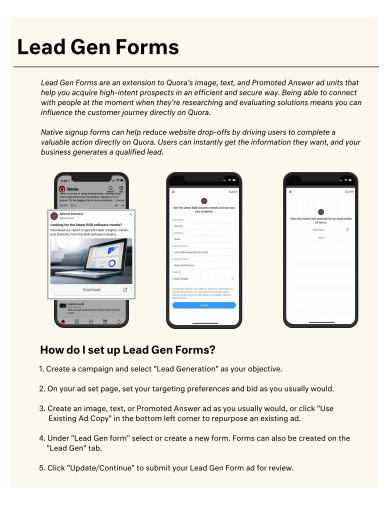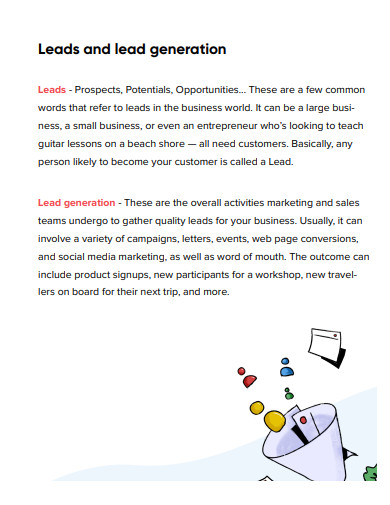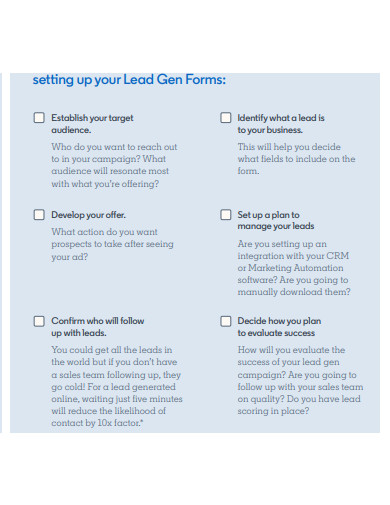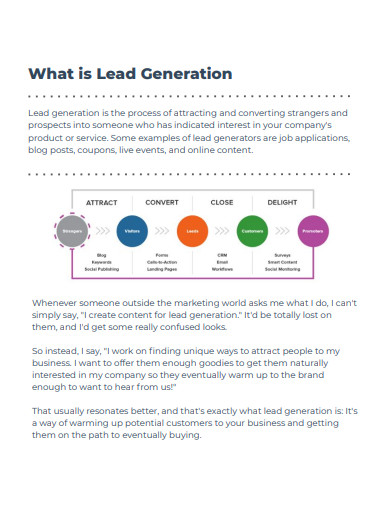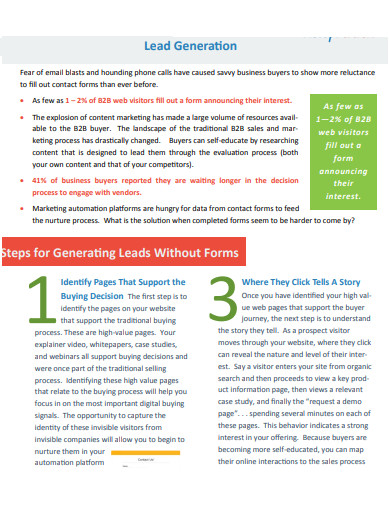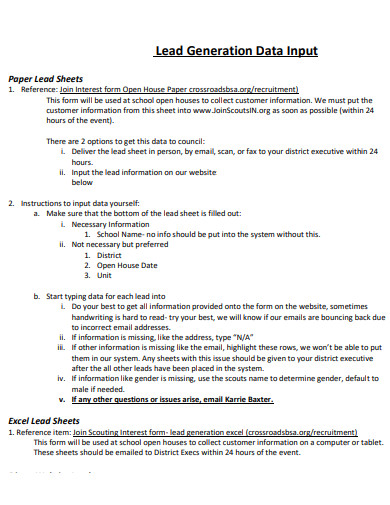Lead generation being used to entail buying lists of names and having salespeople cold call people at their homes, but thanks to technological advancements, we can now produce leads according to precise criteria and data. Companies gather data on prospective buyers and then customize marketing strategies and sales pitches to their requirements. This is primarily accomplished through digital platforms, with some outbound advertising strategies thrown in for good measure (more on that below). Effective lead creation can shorten the sales cycle and enhance the efficacy of gaining more customers.
3+ Lead Generation Form Samples
The practice of garnering the appeal to potential clients in order to develop better sales is known as lead generation. It is an important aspect of many firms’ sales processes. A lead is someone who has expressed interest in a company’s products or services but is not yet eligible to purchase them. They’re potential consumers with whom a corporation hasn’t conducted deals yet but has reasonable grounds to expect they will in the future. Consumers are no longer as engaged in having to listen to a conventional sales pitch that does not necessarily apply to their needs, and it may even drive them away, due to the great quantity of data.
1. Lead Generation Form
2. Sample Lead Generation Form
3. Simple Lead Generation Form
4. Lead Generation Form Example
5. Professional Lead Generation Form
6. Printable Lead Generation
Companies may now more easily research and comprehend their potential leads thanks to the internet era. Companies can modify content to better attract their target clients by knowing their wants and needs, as well as validate any potential avenues based on criteria like interaction and demographic data. It is becoming increasingly crucial for businesses to not only produce new leads, but also to cultivate and maintain connections with them.
When it concerns to lead management, these developments in the buying experience have had an impact on the responsibilities of sales and marketing. Previously, the two teams had distinct roles: marketing would develop a list of leads, while sales would strive to convert those leads into customers.
Marketing now plays a far larger role in the sales process than it did previously, and lead management has evolved into a more coordinated endeavor. Rather of merely passing a list of leads from one team to the next, they collaborate to identify which leads are perfect and develop those connections all throughout sales process.
Any effective lead generation plan requires good advertising and marketing coordination. Although marketing is on the front lines when it comes to lead generation, sales can also assist. The sales staff can take lead generation within their own efforts by using strategies like promoting products or services, outbound mailing, and networking.
The process of deciding whether a lead is suitable to be handed on to sales based on factors such as consumer attributes and behavior is known as lead qualification and filtering. Some prospects will be screened out because they aren’t ready or look to be less viable than others — wasting time and resources on unsuitable leads is a costly process.
FAQs
What makes a lead qualified?
A sales qualified lead is close to making a purchase, but may have further issues or requirements that the sales team must address. Sales staff now continues to nurture the relationship that marketing started. Because these leads have previously been qualified, they are more likely to convert to sales, and the closing stages of the sales cycle move faster. Strong marketing-sales alignment can lead to improved lead generation and conversion rates.
What is inbound marketing?
Inbound marketing is an important approach for generating leads. It is a method of increasing interest in your organization via the creation and promotion of content.
What is outbound marketing?
In the age of online research, some aspects of outbound marketing have become less effective, but it can still be a beneficial tool when used with inbound marketing to target specific possibilities and reach out to leads. Emails, events, and advertisements are examples of outbound marketing.
If you want to see more samples and formats, check out some lead generation forms samples and formats provided in the article for your reference.
Related Posts
Sample Sworn Affidavit Forms
Vehicle Inspection Forms Samples & Templates
Sample Employee Advance Forms
Sample Child Travel Consent Forms
Sample Testimonial Request Forms
Sample Employee Details Forms
Sample Divorce Forms
Sample Attestation Forms
Employee Performance Appraisal Form Templates
FREE 9+ Sample Presentation Evaluation Forms in MS Word
FREE 10+ School Admission Form Samples & Templates in MS Word | PDF
FREE 30+ Patient Consent Form Samples in PDF | MS Word
FREE 10+ Sample Sign Off Form Templates in PDF | MS Word
FREE 11+ Sample Medical Consultation Forms in PDF | MS Word
FREE 8+ Sample Donation Forms in PDF | MS Word

